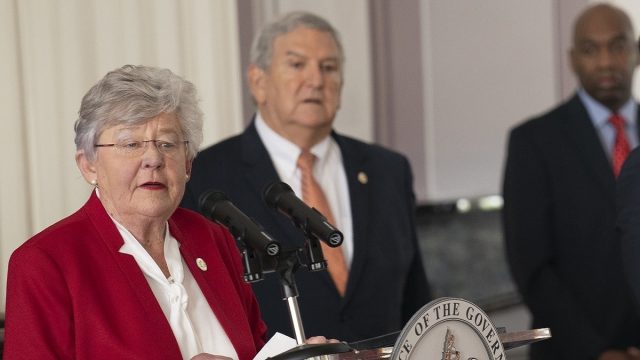By Michael Tomberlin
Alabama Newscenter
Alabama Gov. Kay Ivey said the state’s stay-at-home order will remain in place at least through April 30 while the state health officer called for patience and consideration of the health of the most vulnerable as the COVID-19 crisis continues.
“The stay-at-home order is in place at least through April 30 at this point,” Ivey said. “All of the decisions that I’m going to make are based on data, not a desired date.”
Ivey’s decision is in keeping with her timeline that calls for receiving recommendations from a number of sources, taking that information into account and discussing it with State Health Officer Dr. Scott Harris and the seven-member executive committee of the Coronavirus Task Force.
A detailed set of recommendations April 17 by the Small Business Emergency Task Force, led by Lt. Gov. Will Ainsworth, called for an immediate reopening of many small businesses and phased-in reopening of other businesses and state beaches.
Ivey noted COVID-19’s toll is great on lives and the economy.
“I’m as eager as anybody to get our economy back open spinning on all cylinders again but, again, we have to be careful and cautious in what we are doing and do it in a smart, productive way,” she said. “Y’all, we have Alabamians and Alabama businesses hurting right now. We certainly know who you are and we want to help each of you get back on your feet just as soon as possible.”
Ivey and Harris said the projected peak of the illness in the state is this week.
“What we’re doing is working, and I just plead with the people of Alabama, keep doing what you’re doing – social distancing, personal hygiene, staying at home when you can,” Ivey said.
Harris said the guidelines for reopening the economy released by the White House last week have a number of good benchmarks for Alabama to try to attain, such as hospitals operating within their normal capacity without resorting to emergency standards, an ability to track trends of symptoms, confirmed percentage of those testing positive going down over a two-week period and the ability to test when testing is needed.
Harris said Alabama is close in some of those measures, but not there yet. He said the concern is not for the healthy, but for the more vulnerable.
“We just need people to try to remember that just a little bit longer,” he said. “It’s been, I’m sure, a terrible time for many people for quite a while and I believe that dawn is breaking pretty soon. But we still just have a little bit further to go and we just hope that people can hang in there a little bit longer and try to protect people in their family and in their community.”
ADPH Data
As of 2:30 p.m. Tuesday, the Alabama Department of Public Health (ADPH) reported 5,231 Alabamians have tested positive for the coronavirus with 177 reported deaths, 144 of which were confirmed to be caused by COVID-19.
Ivey said the executive committee of the Coronavirus Task Force has already been at work. State Finance Director Kelly Butler leads the committee, which also consists of Alabama Commerce Secretary Greg Canfield, Alabama Senate President Pro Tem Del Marsh, Alabama Speaker of the House Mac McCutcheon, Blue Cross and Blue Shield of Alabama CEO Tim Vines, UAB School of Medicine Dean Dr. Selwyn Vickers and Dr. Nancy Dunlap Johns, retired dean of medicine at the University of Virginia.
Butler said the committee is looking at the actions of surrounding states, recommendations from the federal level, recommendations from the small business task force and other input from throughout the state.
“The direction to us has been to make recommendations as much as we can based on data, based on facts,” he said. “That’s really the (committee’s) order and directive and that’s the path we’re trying to take.”
Alabama Department of Labor Secretary Fitzgerald Washington said the economic and individual toll of COVID-19 has been staggering.
In the past four weeks, his office has received 306,000 new unemployment filings compared to 130,000 in all of 2019.
“I am pleased to announce that $164 million has been paid to over 104,000 people that have been impacted through no fault of their own as a result of COVID-19,” Washington said, noting an additional $100 million in claims were paid Monday for a total of $264 million. That still represents only 40 percent of the claims filed that have been paid.
“Now I know that there is a lot of tension out there, there is a lot of frustration from people that have been having some difficulty in trying to file their claims,” he said. “I certainly understand that.”
Washington said Department of Labor staff members have been working tirelessly to process claims and that a cloud-based computer system and a call center were added to take on the additional demand.
Unemployment claims have been trending downward in recent days, he said.
Alabama Superintendent of Banking Mike Hill said state banks and lenders have processed 28,000 Small Business Administration Payroll Protection Program loans and distributed $4.9 billion.
Ivey is looking for positive signs but public health has to be weighed along with economic health.
“We can do this and we will do this,” she said.
“My fellow Alabamians, during these unprecedented times, you have truly given new meaning to the words ‘together Alabama,’” Ivey said. “It’s been a challenging month. We’ve lost too many of our loved ones and our way of life has been turned upside down. But better days are ahead. We all look forward to that and I’m confident that our better days are ahead. Thank you so much, people of Alabama, for your partnership and willingness to sacrifice for the greater good.”




